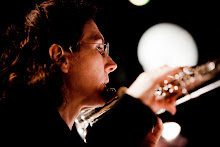 | |
| "Not the damned Waldstein again!" |
OK, that was way simplified. Better informed and better working minds than mine have pondered and written about the evolution of the Second Viennese School. My point is to look at now. The biggest question that I ask myself in my ensemble work as a "contemporary" musician is this: Where is the music?
Schönberg may have been seeking artistic and intellectual integrity in music, but I want to know WTF happened to music itself? Yes, I am peevish and here's why: Music seems the least important aspect to almost every project we do. If it's a theater project, the visual aspect must take precedence (and be sensational, damn the score!). If it is multi media, the technology takes precedence. If it is "purely" musical, it must be set to a theme that draws audience members in, regardless of quality. (How else do pieces like Henri Pousseur's La Seconde Apothéose de Rameau get programmed?)
One benefit of all this is that contemporary classical music is reaching a wider audience. But are we marketing it to death and losing sight of the search for something genuine and meaningful? When I finished my formal musical studies I had a limited number of choices. Contemporary music was one of the least remunerative, but I felt it fit my Geist, somehow. I felt I understood the drive of 20th century composers such as Schönberg and Boulez to find a new language that satisfied both the intellect and the aesthetic. (Not that I put myself on the same level as them!)
 |
| Nice weather we're having, did you enjoy the concert? |
Rewind, look at Schönberg's Vienna. Salons, forced small talk, social, artistic and economic comparison of others in a bourgeois setting. I don't want it. I want the music back.
 | |
| Revolution sucks. Evolution rocks. |

